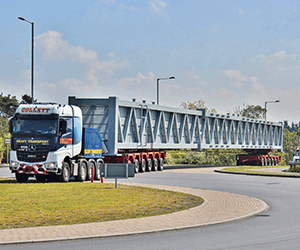The incident happened during construction of the Sleaford Renewable Energy plant on 14 February 2013 when the 4.5 tonne conveyor section overturned during installation.
It trapped Michael Doyle, a 49-year-old employee of Derby-based Shaw Group UK Ltd, who suffered multiple injuries including four cracked vertebrae, broken ribs, a punctured lung and broken ankle.
He has not returned to work since.
Lincoln Magistrates’ Court heard that Shaw Group UK Ltd had been subcontracted to install a boiler and associated equipment , including a conveyor system to carry large straw bales, by Burmeister and Wain Energy (BWE).
BWE was one of two Danish companies, the other being Burmeister and Wain Scandinavian Contractor (BWSC), that had formed a consortium to design and build the centre, which burns straw and wood to create electricity.
Shaw Group UK Ltd had already lifted three conveyor sections on to a slope leading up to the boiler by craning them on to a platform at the bottom of the slope.
Skates were bolted to the front and rear legs which helped keep the section of conveyor on rails as it was dragged up the slope by manual winches set up at the top.
In order to fix the sections of conveyor in place workers needed to remove the skates and used jacks to raise the legs enough to take the skates off and then lower the legs down onto the rail.
This was carried out successfully on the first three sections but as the jacks were released, on the lower legs of the fourth and final section, one side lowered faster than the other and the conveyor swung towards two workers before violently swinging the other way and turning on its side, trapping Doyle underneath.
An HSE investigation identified safety failings by all three companies.
Shaw Group UK Ltd had produced a risk assessment and a plan for the installation but it did not consider removal of the skates from the legs of the conveyor sections or the manual winching of the load up the slope.
The document had been sent to BWE for checking but the company did not pick up on the omission.
The lifting operation using jacks was not carried out safely and none of the three defendants was managing or monitoring the work in a way that would ensure its safety.
The investigation also found that BWSC failed in its responsibility as principal contractor to ensure work was properly assessed and co-ordinated between the many contractors on site.
Shaw Group UK Ltd, of Derby, was fined a total of £17,350 and ordered to pay costs of £1,710 after pleading guilty to safety regulations.
Burmeister and Wain Scandinavian Contractor, of Allerød, Denmark, was fined £4,670 and ordered to pay costs of £1,710 while Burmeister and Wain Energy, of Kgs Lyngby, Denmark, was fined £5,350 and ordered to pay costs of £1,710.
Speaking after the hearing, HSE inspector Martin Giles said: “This was a large site with multiple contractors and up to 300 people working at any one time.
“Although there was a series of site rules set out in a construction phase plan, BWSC’s management of the site was poor as each of the main contractors ran their own areas of the site as they desired and were able to set additional rules.
“This led to different procedures being followed and a lack of control over temporary works.
“The failure to ensure work was carried out safely on the slope was symptomatic of more general failures which were the responsibility of principal contractor BWSC in setting the rules, procedures and checks needed to manage a large site. These failures put all the workers on site at risk.
“BWE specified the use of skates for installing the conveyor system but removing them required adequate risk assessment.
“Although the company had read the assessment and method statement produced by Shaw Group it made no comment on it and did not approve it before it was implemented. BWE should have picked up on that document’s failures and asked Shaw Group to re-evaluate before work was allowed to begin.
“Shaw Group UK Ltd’s risk assessment was flawed, and its management and monitoring of the task was not sufficient to identify potential problems and stop the work in the four days before Mr Doyle was hurt.
“The actual method of work followed by its employees was unsafe and led to Mr Doyle’s injuries when the load overturned.”






















































.gif)





